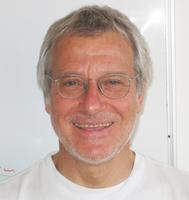Control and Machine Learning
Enrique Zuazua – Friedrich–Alexander University, Germany

In this lecture we shall present some recent results on the interplay between control and Machine Learning, and more precisely, Supervised Learning and Universal Approximation. We adopt the perspective of the simultaneous or ensemble control of systems of Residual Neural Networks (ResNets). Roughly, each item to be classified corresponds to a different initial datum for the Cauchy problem of the ResNets, leading to an ensemble of solutions to be driven to the corresponding targets, associated to the labels, by means of the same control. We present a genuinely nonlinear and constructive method, allowing to show that such an ambitious goal can be achieved, estimating the complexity of the control strategies. This property is rarely fulfilled by the classical dynamical systems in Mechanics and the very nonlinear nature of the activation function governing the ResNet dynamics plays a determinant role. It allows deforming half of the phase space while the other half remains invariant, a property that classical models in mechanics do not fulfill. The turnpike property is also analyzed in this context, showing that a suitable choice of the cost functional used to train the ResNet leads to more stable and robust dynamics.
This lecture is inspired in joint work, among others, with Borjan Geshkovski (MIT), Carlos Esteve (Cambridge), Domènec Ruiz-Balet (IC, London) and Dario Pighin (Sherpa.ai).
Biography: Enrique Zuazua Iriondo (Eibar, Basque Country – Spain, 1961) holds a Chair of Dynamics, Control and Numerics – Alexander von Humboldt Professorship at FAU- Friedrich–Alexander University, Erlangen–Nürnberg (Germany). He also leads the research project “DyCon: Dynamic Control”, funded by the ERC – European Research Council at the Department of Mathematics, at UAM – Autonomous University of Madrid and Deusto Foundation, University of Deusto – Bilbao (Basque Country, Spain), where he holds secondary appointments as Professor of Applied Mathematics (UAM) and Director of CCM – Chair of Computational Mathematics (Deusto). His research in the area of Applied Mathematics covers topics in Partial Differential Equations, Systems Control, Numerical Analysis and Machine Learning, and led to fruitful collaborations in different industrial sectors such as the optimal shape design in aeronautics, the management of electrical and water distribution networks and the design of recommendation systems. His research had a high impact (h-index 44) and he has mentored a significant number of postdoctoral researchers and coached a wide network of Science managers. He holds a degree in Mathematics from the University of the Basque Country, and a dual PhD degree from the same university (1987) and the Université Pierre et Marie Curie, Paris (1988). In 1990 he became Professor of Applied Mathematics at the Complutense University of Madrid, to later move to UAM in 2001. He has been awarded the Euskadi (Basque Country) Prize for Science and Technology 2006 and the Spanish National Julio Rey Pastor Prize 2007 in Mathematics and Information and Communication Technology, the Advanced Grants NUMERIWAVES in 2010 and DyCon in 2016 of the European Research Council (ERC) and the SIAM W.T. and Idalia Reid Prize 2022. He is an Honorary member of the of Academia Europaea and Jakiunde, the Basque Academy of Sciences, Letters and Humanities, Doctor Honoris Causa from the Université de Lorraine in France and Ambassador of the Friedrisch-Alexandre University in Erlangen-Nurenberg, Germany. He was an invited speaker at ICM2006 in the section on Control and Optimization. From 1999-2002 he was the first Scientific Manager of the Panel for Mathematics within the Spanish National Research Plan and the Founding Scientific Director of the BCAM – Basque Center for Applied Mathematics from 2008-2012. He is also a member of the Scientific Council of a number of international research institutions such as the INSMI-CNRS and CERFACS in France and member of the Editorial Board in some of the leading journals in Applied Mathematics and Control Theory.




Location
Montréal Québec
Canada